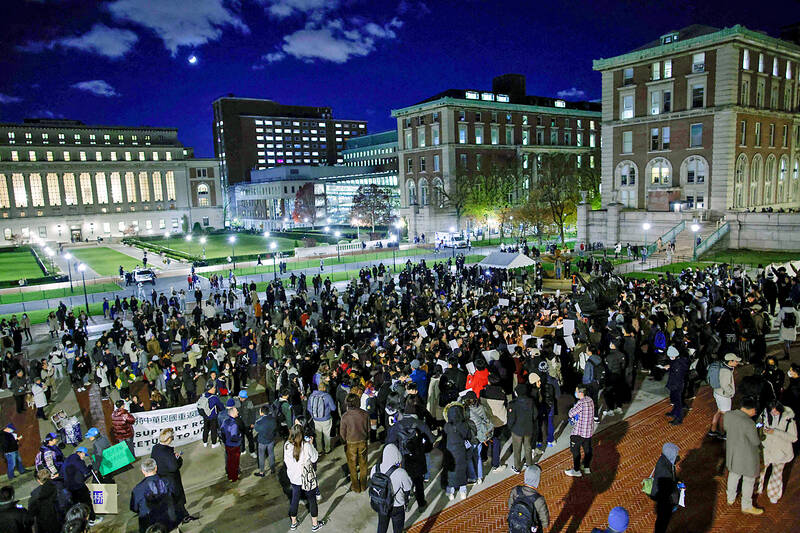Chinese universities sent students home and police fanned out in Beijing and Shanghai to prevent more protests yesterday after crowds angered by severe anti-virus restrictions called for Chinese President Xi Jinping (習近平) to resign in the biggest show of public dissent in decades.
Authorities have eased some controls after demonstrations in at least eight mainland cities and Hong Kong — but showed no sign of backing off their larger “zero COVID” strategy that has confined millions of people to their homes for months at a time. Security forces have detained an unknown number of people and stepped up surveillance.
With police out in force, there was no word of protests yesterday in Beijing, Shanghai or other major mainland cities. A far smaller group gathered at the University of Hong Kong to protest virus restrictions.

Photo: AFP
Beijing’s Tsinghua University, where students rallied over the weekend, and other schools in the capital and the southern province of Guangdong said they were protecting students from COVID-19 by sending them home. However, dispersing them to far-flung hometowns also reduces the likelihood of more demonstrations.
Beijing Forestry University also said it would arrange for students to return home. It said its faculty and students all tested negative for the virus.
Universities said classes and final exams would be conducted online.
In Shanghai, police stopped pedestrians and checked their phones on Monday night, a witness said, possibly looking for apps such as Twitter that are banned in China or images of protests. The witness, who insisted on anonymity for fear of arrest, said he was on his way to a protest, but found no crowd there when he arrived.
Sympathy protests were held overseas, and foreign governments called on Beijing for restraint.
US Secretary of State Antony Blinken told reporters that Washington’s position on the protests in China was the same as it was for demonstrations anywhere.
“We support the right of people everywhere to peacefully protest, to make known their views, their concerns, their frustrations,” he said yesterday in Bucharest.
In London, the British government summoned Chinese Ambassador to the UK Zheng Zeguang (鄭澤光) as a protest over the arrest and beating of a BBC journalist in Shanghai.
British Secretary of State for Foreign, Commonwealth and Development Affairs James Cleverly, who was attending a NATO summit in Bucharest, said that “it is incredibly important that we protect media freedom. It is something very, very much at the heart of the UK’s belief system.”
Chinese Ministry of Foreign Affairs spokesman Zhao Lijian (趙立堅) disputed the UK’s version of events, saying Edward Lawrence failed to identify himself as a journalist and accusing the BBC of twisting the story.
Asked about criticism of the crackdown, Zhao defended Beijing’s anti-virus strategy and said the public’s legal rights were protected by law.
The government is trying to “provide maximum protection to people’s lives and health while minimizing the COVID impact on social and economic development,” he said.

The CIA has a message for Chinese government officials worried about their place in Chinese President Xi Jinping’s (習近平) government: Come work with us. The agency released two Mandarin-language videos on social media on Thursday inviting disgruntled officials to contact the CIA. The recruitment videos posted on YouTube and X racked up more than 5 million views combined in their first day. The outreach comes as CIA Director John Ratcliffe has vowed to boost the agency’s use of intelligence from human sources and its focus on China, which has recently targeted US officials with its own espionage operations. The videos are “aimed at

STEADFAST FRIEND: The bills encourage increased Taiwan-US engagement and address China’s distortion of UN Resolution 2758 to isolate Taiwan internationally The Presidential Office yesterday thanked the US House of Representatives for unanimously passing two Taiwan-related bills highlighting its solid support for Taiwan’s democracy and global participation, and for deepening bilateral relations. One of the bills, the Taiwan Assurance Implementation Act, requires the US Department of State to periodically review its guidelines for engagement with Taiwan, and report to the US Congress on the guidelines and plans to lift self-imposed limitations on US-Taiwan engagement. The other bill is the Taiwan International Solidarity Act, which clarifies that UN Resolution 2758 does not address the issue of the representation of Taiwan or its people in

US Indo-Pacific Commander Admiral Samuel Paparo on Friday expressed concern over the rate at which China is diversifying its military exercises, the Financial Times (FT) reported on Saturday. “The rates of change on the depth and breadth of their exercises is the one non-linear effect that I’ve seen in the last year that wakes me up at night or keeps me up at night,” Paparo was quoted by FT as saying while attending the annual Sedona Forum at the McCain Institute in Arizona. Paparo also expressed concern over the speed with which China was expanding its military. While the US

SHIFT: Taiwan’s better-than-expected first-quarter GDP and signs of weakness in the US have driven global capital back to emerging markets, the central bank head said The central bank yesterday blamed market speculation for the steep rise in the local currency, and urged exporters and financial institutions to stay calm and stop panic sell-offs to avoid hurting their own profitability. The nation’s top monetary policymaker said that it would step in, if necessary, to maintain order and stability in the foreign exchange market. The remarks came as the NT dollar yesterday closed up NT$0.919 to NT$30.145 against the US dollar in Taipei trading, after rising as high as NT$29.59 in intraday trading. The local currency has surged 5.85 percent against the greenback over the past two sessions, central